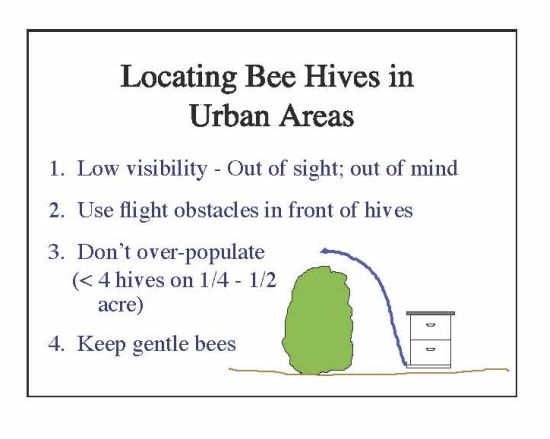The bee blogosphere (hiveosphere?) and listservs were abuzz the past two
days with news that Madison, Wisconsin, has taken an active role in
encouraging beekeeping within the city limits. The version of the
story I found a link to was in the Madison Commons.
Apparently beekeeping was prohibited in town (though the prohibition was
rarely enforced, except in the case of complaints). The ordinance was
changed to allow urban beekeepers to keep hives.
There are specific regulations, such as 25′ distance to the nearest
neighbor as well as a requirement to supply a fresh water source near
the bees (very important – especially in urban settings).
Flight barriers – fences, shrubbery, or sheds are also required. This
is a simple bit of beekeeping etiquette if you have close neighbors.
Bees will fly straight in and out of the hive entrance, usually just a
foot or two off the ground. They’ll maintain this altitude until
forced to go up or down. Constructing, planting, or placing the hives
in front of an existing barrier they must fly over ensures they will
maintain a higher altitude coming and going and not zip across your
neighbor’s lawn at kid-eyeball height.
I’m currently learning stuff like this and much, much more in the
brand-new Virginia Master Beekeeper Program, taught by the most
excellent Bee Professor on the planet, Dr. Rick Fell. Honeybee
physiology and sociology is absolutely astounding. I’ve been beekeeping
for four years now, and am just finding out with this class how much I
didn’t know. I was also unaware that incidences of beehive thievery are
at an all-time high, hence the out-of-site suggestion.
I’ll probably continue to pop out with the occasional post on bees,
because I just can’t curb my enthusiasm. "Cleansing flights" might be a
good topic…

Slide from Dr. Richard Fell’s immense bastion of knowledge.
Beekeeping has become pretty hot up here in NoVa & DC. While I would like to have a hive, we are prevented because of my wife’s allergies to bee stings. Still, I try to support them by providing great nectar sources! Looking forward to the random bee post in the future …
I’m also interested in beestuff, especially science-based info on top-bar hives and approaches to beekeeping that are less farming for honey and pollination contracts, and more hobby/naturalist oriented.
Fascinating! So if you see bees generally flying upward, they’re headed for their hive? We live in a wooded area and the last couple of years we’ve had many bees coming to the bird bath. When they leave they head upwards into the woods. Maybe I should try to find their hive, just for curiosity. No, I don’t plan on raiding their honey!
SandyG, the upward-flight thing is just to get over an obstacle – that’s the point of the flight obstacle. “Your” bees may very well be
in a tree. And they do love birdbaths (and swimming pools). Keep supporting the bees, Trent! Ray, I have zero experience with top-bar hives. Might check with your local beekeeping association.
Alas, the lightened restrictions would still not favor beekeeping in my city. Currently we have setback of 500 feet from inhabitable structures. I doubt there’s built-on acre within the city limits that meets that requirement. Even 25 feet in my suburban neighborhood might be tough to come by. There is exactly one 1-foot-square spot on my property that is 25 feet from the neighbors’ homes. It’s only 15 feet from my home, however. Does that count ?
Laura B., wow, that’s a serious setback (unintentional pun). What if you just put the hive in your guest room and leave the window open 😉
My parents live out in the country in Evansville, WI. There is a local beekeeper up the road a bit & his bees are swarming into my parent’s yard. They are taking all the water from their waterfall & pond & my neice has been stung 7 times within the past 2 months. What are the regulations on issues like this?
Your parents should first notify the beekeeper – bees need lots of water, and it’s the responsibility of the beekeeper to provide it. That may solve the problem. Municipalities vary widely regarding beekeeping regulations – they’d need to check with the City/County to see what the codes are in place.
This course seems to be really cool…i’m very interessted in…i began from scratch and made great experience with “Beekeeping for Beginners” – The Lazy Way
http://woodbees.info
Check it out, thanks.